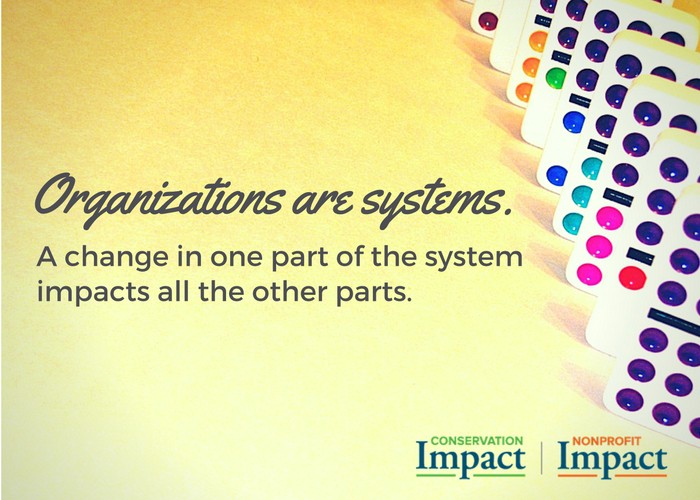
Organizational Analysis and Systems Thinking
We rely on organizational analysis with every client, with every project. It’s now we ensure they have the context needed to make informed decisions about the future of their organization or agency.
The key to doing good organizational analysis is to examine the organization comprehensively and holistically. Something the organizational development literature calls this systems thinking.
Systems thinking is also what leaders and managers need in order to unpack what an organizational analysis (or any other kind of relevant data) is telling them.
But being a systems thinker can be challenging when you spend most of your time focusing on various parts of your organization—this staff person, that board committee, those different programs over there.
The Systems Thinker in Action
Essentially, systems thinking is just what it sounds like: understanding how your organization operates as a system. How changes in one area impact other areas. How input in one place leads to outcomes in another. How that an issue cropping over here might actually indicate a problem all the way over there. For example, the Executive Director who uses systems thinking understands that hosting a fundraising event will pull some staff time and energy from mission-related work as well as strain cash flow.
The systems thinker reviews an organizational analysis, dashboard data, or the challenges or opportunities arising from their external environment and asks: What does this mean for making progress towards our goals? In what ways should we adapt?
For instance:
• Given our new strategic plan, what do we have to do differently moving forward?
• How does this new tax policy affect our financial supporters and what does it mean for our revenue model?
• When that person retires, how will other staff cope with changes in their workload and what will it mean for relationships with our clients?
We call these, implications questions. Consistently examining what implications a piece of relevant information hold for your organization as a system keeps a leader focused on what’s most important and able to confidently decide when to make mid-course corrections.
TLDR: Don’t just read the information that comes across your desk (or from your consultant). Use systems thinking to examine the implications and decide what, if anything, you will do differently to strengthen your organization and maximize your impact.
(image credit: Jeff Prieb)

